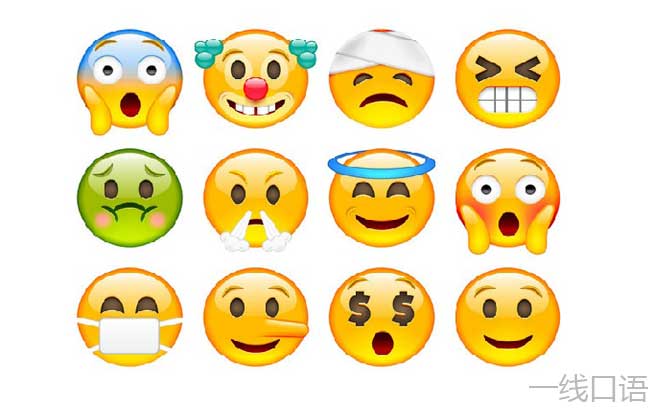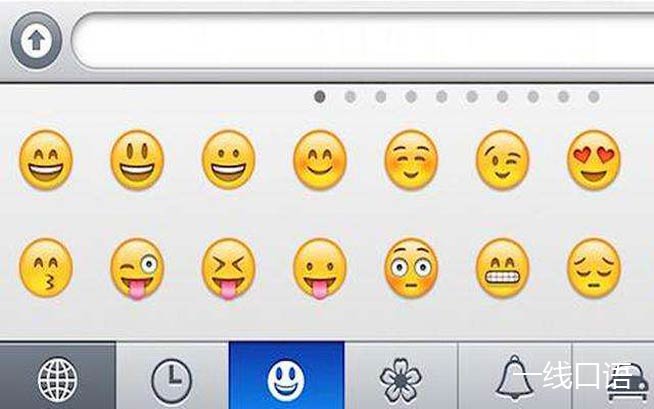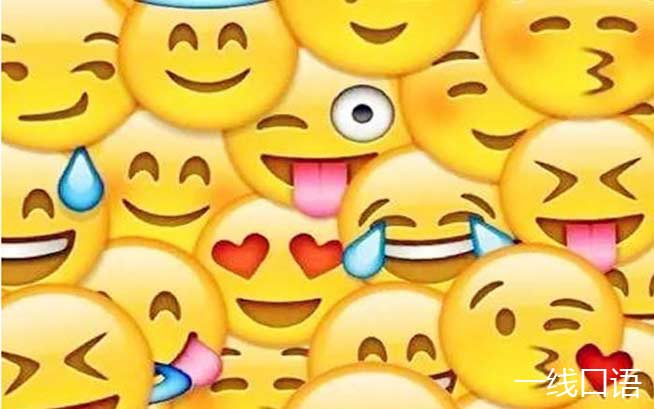双语资讯:使用emoji表情跟性格有关系吗?
来源:本站原创发布时间:2018-07-25 18:53:30
活在这个即时通讯的时代,我们已无法离开手机上的交流软件。时刻使用软件,除了帮助练就了一手打字好技能,我们最常选择的emoji表情,也成为传达情绪和表达自我的最佳法宝。
说起emoji,大家最熟悉的应该就是“喜极而泣”了吧。据emojitracker给出的数据,截止至目前,“喜极而泣”的表情已在全球最大的社交平台之一Twitter上被使用了超过14亿次,是当之无愧的最火emoji。
一方面,Emoji在即时信息服务以及社交媒体中越来越多地被使用,特别是在年轻人中,emoji被作为一种快速、非正式的方式来传达情感和态度。另一方面,多项研究表明,emoji的个体使用差异可能表现了个体心理特征的差异。那么使用emoji表情真的跟性格有关吗?今天的日常英语内容给你答案。

一、常用某个emoji是性格使然?
Most recently, a group of researchers from Edge Hill University in England evaluated the link between emoji use and personality in two companion studies.
最近,来自英国边山大学的学者就在两项研究中分析了emoji使用与性格的关系。
The first study aimed to examine how certain psychological considerations, like social anxiety, self-esteem and personality impact emoji use on text messages, Facebook and email. Participants self-reported emoji/emoticon use and personality characteristics. Then they provided data from Facebook accounts and spent 10 minutes interacting online with other participants.
科学家想通过第一项研究了解心理因素(如焦虑、自尊和个性等)如何影响人们在短信、社交媒体和邮件中的emoji使用。被试者需要对表情使用和性格特点做出自我报告,并提供脸书上的数据,然后与其他被试者进行10分钟的网络互动。
"Trait analysis revealed that agreeableness was positively related to self-reported emoticon usage on Facebook, but not in texts or emails," the researchers note in the paper.
研究者发现,被试者的性格宜人度与脸书表情使用有关,跟短信和邮件中的无关。
The second study required participants to make personality judgments based on the Facebook pages of the other study members. "We have found that the amount of smiley emojis people use on Facebook, is related to other people judging them to be agreeable, conscientious and open to experience,"
在第二项研究中,被试者需要对其他人所提供的脸书数据评估他们的性格特征。研究者发现,人们在脸书中使用的笑脸表情越多,别人就越倾向于认为他们和蔼、尽责和开朗。

二、用emoji测性格,靠谱吗?
这项研究发现神经质高(即情绪不稳定)的人与表示负面情绪的emoji表情具有强烈的关系,而外向性的人与表示积极情绪的emoji相关。也就是说,外向的人会更多使用表示积极情绪的emoji,而情绪不稳定的人会更多使用表示消极情绪的emoji。
According to the researchers, text, email and social media communications can actually wind up being less inflammatory than face-to-face conversations because we generally take more time to think before we type. "This therefore reveals that there may be unique underpinnings associated with emotional communication via emoji usage that may be inherently different from face-to-face expression," they write.
研究者还认为,在短信、邮件和社交媒体交流,不如面对面交流更有煽动性,因为人们在打字之前需要花费更多时间让语言过一过脑子。“正是因此,emoji表情所传递的情绪可能与面对面交流有着根本的不同。”
Although it might seem counterintuitive, the psychologists were able to surmise that people are more likely to accurately judge a person's level of "openness to experience" by visiting their Facebook page, than if they had a face-to-face conversation with them. In fact, they describe openness as "largely undetectable" in those critical one-on-one first impressions.
这可能很反直觉,但心理学家认为,人们可能喜欢通过别人的脸书主页判断他人性格,而不是跟别人进行面对面交流。然而,在首次面对面交流时,人们基本上是无法判断对方是否开朗的。

三、常用emoji的英文含义是什么
1.grin 咧嘴笑
grin和微信里的smile的表情不一样,grin是咧嘴笑,一般是表示真的开心的笑,而不是“呵呵”。
Eg. Jenny couldn't hide her delight. She just greeted everyone with a grinning face.
珍妮藏不住喜悦,她每跟一个人打招呼都咧嘴笑了。
2.tears of joy 笑哭
“Tears of joy(笑哭)”通常在我们觉得一件事情很搞笑或者让人哭笑不得的时候使用。这个emoji还被牛津英语词典评为2015年年度词汇。
Eg. When he told that joke, she burst out laughing with tears of joy.
当他讲那个笑话的时候,她笑哭了。
3.screaming in fear 惊恐地尖叫
通常在遇到非常令人惊讶或者恐惧的事情时会使用的emoji。
Eg. Hearing that her boss was coming, she suddenly screamed in fear.
听到她老板正在前来的消息后,她突然惊恐地尖叫了一声。
4.smirk 自鸣得意的笑;幸灾乐祸的笑
smirk一般是在自己知道别人不知道的事情或者在幸灾乐祸的时候露出的“迷之微笑”。
Eg. That was more of a smirk when he witnessed that prank on me.
他在看到我被恶作剧时的迷之微笑更像是在幸灾乐祸地笑。
5.pensive 忧郁
眉毛和眼睛耷下来的表情,一般都是表示忧郁。pensive表示闷闷不乐、沉思的样子。
Eg. She stared out of the window at the rain, with a pensive face.
她闷闷不乐地凝望着窗外的雨。
没想到emoji也能学到这么多有用的英语吧?你最喜欢的emoji表情是哪一个呢?快快分享给我们!
浏览:5216
 1
1
上一篇: 学好日常英语口语,怎么都少不了这3招!
下一篇: 双语:今年大学录取通知书太惊艳!你get到哪一款?
-
SHE新歌《十七》引发回忆杀,八零九零集体泪奔!

想必这几天不少人的朋友圈都被SHE的新歌《十七》刷屏了吧?动人的旋律、朴实的歌词,尤其是走心的MV让不少人泪目,大家纷纷称赞说这是18年最感人的歌曲。
2018-09-18 09:54:36 -
《我是演员》开播后争议不断!看各路大咖如何飙演技

大家还记得去年名噪一时的综艺节目《演员的诞生》吗?如今,它的第二季正式更名为《我就是演员》,以全新的面貌再度重磅归来,引发观众新一轮的期待。
2018-09-20 09:25:23 -
第70届艾美奖完美落幕!你pick的美剧得奖了吗?

有“电视剧界奥斯卡”之称的艾美奖颁奖典礼日前圆满举行,大热剧集《权力的游戏》和《了不起的麦瑟尔夫人》赢得盆满钵满。想知道你喜欢的美剧有没有得奖?一起来看文章吧。
2018-09-21 09:39:50 -
李晨各种黑历史被扒,“好男人”人设真的崩塌了?

自“阴阳合同”事件后,范冰冰彻底淡出公众视线,连微博都100多天没有更新了。虽然范的微博下面冷冷清清,但她的男友李晨最近却频频登上热搜,微博评论下面简直炸开了锅。
2018-09-26 09:05:26 -
吴秀波被曝出轨!小三、婚外情、出轨等英语咋说?

今年中秋节,没想到最好吃的不是月饼,而是来自娱乐圈的“大瓜”。号称“师奶杀手”的演员吴秀波被曝疑似出轨7年,这可让广大观众大跌眼镜!具体是怎么回事呢?
2018-09-28 09:21:37 -
《绯闻女孩》、《还珠格格》翻拍!网友:求放过!

影视圈近几年来翻拍之风盛行,很多曾经受欢迎的影视剧都逃脱不了被翻拍的命运。最近就有消息称《绯闻女孩》、《还珠格格》等作品都将被翻拍。网友纷纷表示:求放过!
2018-09-29 09:28:27 -
范冰冰被开巨额罚单,李晨发声力挺却被骂“马后炮”

范冰冰“阴阳合同”事件在这几天暂时告一段落,结果在意料之外却也是情理之中。范冰冰被罚款近8.8亿,她本人也公开致歉,承认错误。男友李晨发声力挺却被网友骂“马后炮”。
2018-10-09 09:14:38 -
范冰冰的道歉信走进中学课堂,语病太多成改错素材

范冰冰逃税被开巨额罚单的事情前些天是告一段落了,但这些天她依然处在风口浪尖上。先是男友李晨发微博被骂,如今道歉信又被指出语病太多,甚至还被搬上课堂做改错素材。
2018-10-11 09:14:15
-
 盘点外教一对一英语口语培训价格一般多少钱 2020-03-24
盘点外教一对一英语口语培训价格一般多少钱 2020-03-24 -
 盘点北京好的英语外教一对一价格以及相关判断标准 2020-03-24
盘点北京好的英语外教一对一价格以及相关判断标准 2020-03-24 -
 分享10个学英语口语最好的方法 2020-03-24
分享10个学英语口语最好的方法 2020-03-24 -
 10个教你怎样学英语最有效的方法 2019-08-01
10个教你怎样学英语最有效的方法 2019-08-01

